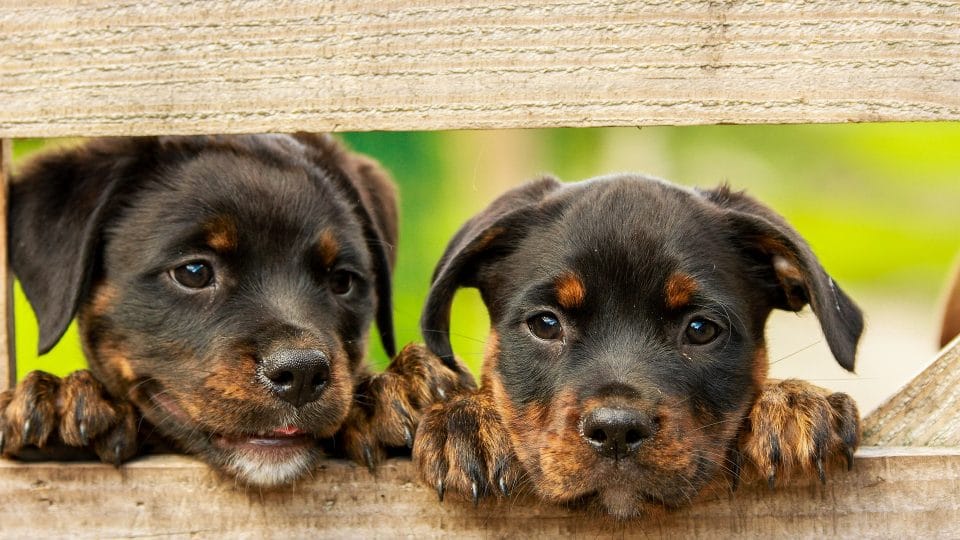Often known by their owners as gentle giants, Rottweilers have been unfairly depicted in movies as the “evil villains.” Excellent protectors (and very silly), these large dogs are equal parts lovable and calm. Growing up, Rottweiler puppies don’t understand their own size, and often try to jump up on your lap for some quality snuggles.
As far back as the Roman Empire, distant relatives of the Rottweilers were bred to protect the herd while an army waged battle against their enemies. The empire needed a mix of sturdiness and a dog that can move great distances over time. A Rottweiler’s roots come from an Asian Mastiff that received the official name of “Rottweiler Metzgerhund,” or Butcher’s Dog of Rottweil, after the cattle town of Rottweil that relied on these dogs as loyal protectors of their livestock.
Rottweilers do more than help protect, of course. Many are wonderful therapy dogs too.

Flickr/lorraineyeung
Rottweiler puppy facts
Whether your pup is meant to be a therapy dog, a livestock protector, or a celebrated children’s book hero like Good Dog Carl, here are some facts about Rottweiler puppies.
| Size | Medium-Large. Adult males range from 60-68cm (24-27 inches) and weigh 43-61kg (95 to 135lbs), while females are 55-63cm (22-25 inches) and weigh in at 36-45kg (80-100lbs). |
| Breed Characteristics | The Rottweiler is a large, muscular, and stout dog. They have a short black coat and rust markings scattered throughout their underside. Due to their big-boned and compact bodies, they are built for endurance rather than speed. As puppies, their rust-brown markings are more prominent and fade a little as they grow. |
| Temperament | Rottweilers are people-loving dogs, and sometimes they have trouble sharing their humans with other furry friends. Rottweiler puppies are naturally intelligent and highly trainable but may also be stubborn depending on the situation. Teaching them early to play with other dogs is important, as it helps establish proper socialisation skills and boundaries. |
| Grooming and Health Needs | A Rottweiler’s undercoat is on their neck and thighs. They need to be brushed (weekly or as needed) and bathed regularly. They shed twice a year, in the spring and fall seasons. Otherwise, they only moderately shed throughout the year.
Rottweilers have been known to get hip dysplasia and cancer and should get hip and elbow evaluations, cardiac exams, and Ophthalmologist evaluations regularly. |
| Training | Early puppy training and socialisation is highly beneficial, as Rottweilers tend to be territorial. Even during puppyhood, it is not recommended to roughhouse too much, as that can encourage aggressive behaviours later in life. Consistency is important with this breed. They must know what to expect from their humans early on and have a daily routine set in place. |
| Energy Level | For the most part, Rottweilers are a fairly calm breed. They love to take walks (or do anything!) with their owners. They have a naturally strong, muscular build, but this breed can gain weight if not exercised regularly. Be sure to have plenty of jobs for a Rottweiler to do, as they get bored pretty quickly. They also love to swim. |
| Life Span | 9 to 10 years |
Who is the best human for a Rottweiler?
Like most dogs, they feed off their human’s energy. Rottweiler puppies do well with a calm, assertive human and thrive in a well-structured environment. A lot of chaos may cause frustration in a Rottweiler’s world, so these dogs are best suited for someone with a routine that doesn’t alter often. And if you can’t be around as much as you need to be, you can find a local sitter on Rover.com who provides dog boarding and can give your dog all the attention they deserve while you’re gone.
Most importantly, they love to give and receive affection. Rottweilers crave physical touch and may follow you from room to room, leaning their heads on your legs. They are bonded to their human for life, and want to show their love!
Getting a Rottweiler puppy
Choosing to adopt or go through a breeder for your new Rottweiler puppy is a personal choice that requires research. Thankfully, there are many resources out there to help you find a rescue or breeder that offers healthy, ethically-sourced Rottweiler puppies.
Knowing what you’re in for when you get a Rottweiler puppy is an important step in being a responsible pet owner. Whether you find a responsible breeder or are planning on adopting, it’s up to you to be prepared for an energetic and friendly addition to your household.
Adopting Rottweiler puppies
Most breed rescues report that a majority of their rescue dogs come from individual owner surrender, with the most common reasons being a change in lifestyle or the breed not being right for them. This means that there may be many dogs and puppies out there that are looking for a new forever home.
The main difference between a breeder and a rescue is that a rescue may not always have young puppies to choose from. The benefit, however, is that most are mandated to only adopt out dogs that have been microchipped and spayed/neutered. This means you may end up with a dog that’s already been housebroken, and doesn’t need these common medical procedures. You may also find a Rottweiler mix that has all the traits you want from the breed, but with a little extra thrown in.
Finding a Rottweiler rescue can be as simple as searching the internet. The Kennel Club also has an excellent list of Rottweiler rescues on their site.
Finding a Rottweiler breeder
The first step is to do your research. Sadly, there are many puppy mills posing as reputable breeders along with many online scams. Be aware, and reach out to different online forums for conversations about getting your future furry family member.
Be sure to ask questions, make arrangements to meet the parent dogs or mother, and follow your gut. If something seems wrong at a breeder you visit, or the Rottweiler puppy seems too good to be true, there’s likely something going on. The Kennel Club also offers resources for finding a breeder, with fairly strict guidelines on who they let participate.
Rottweiler puppy resources
After you find the right Rottweiler puppy, it’s time to prepare your home! Here are a few resources to get you started:
How Long Can You Leave a Puppy Alone?
Teach Your Puppy to Sleep Through the Night: A Dog Trainer’s Method
Your Puppy’s Emotional Development Month by Month
18 Weirdly Cool Dog Facts Every New Puppy Parent Should Know



